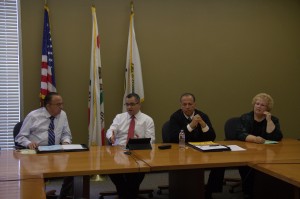 _________________________________
_________________________________


 “In towns and cities... there is no more important institution than the local paper.”
Warren Buffett
“In towns and cities... there is no more important institution than the local paper.”
Warren Buffett

Norwalk City Councilman Luigi Vernola, Mayor Marcel Rodarte, Vice Mayor Leonard Shryock, and Councilwoman Cherri Kelley review city’s RV Parking Ordinance at a meeting held this week at Norwalk City Hall. Pete Parker Photo and Article.
By Pete Parker
The Norwalk City Council held a study session before its council meeting on Tuesday night to review parking restriction policies for commercial and recreational vehicles.
Mayor Marcel Rodarte and other city councilmembers discussed the cities regulations on the vehicles and if future limitations where implemented, what impact would it have on community members who own the popular travel units.
Councilmembers discussed the implementation of increased parking restrictions for commercial and recreational vehicles and reviewed associated costs to post new signs citywide.
City Manager Mike Egan posed the question to the city council, “Do you believe that recreational vehicles are an issue for the city? I feel we will need more strict regulations.”
Councilmember Luigi Vernola stated during the study session that, “I don’t, recreational vehicles should not be on the streets at all.”
In accordance to CA Vehicle Code there is a 72 hour parking limit on commercial vehicles, recreational vehicles and trailers. It is the responsibility of Public Safety Officers to make routine responses to complaints and to enforce a notice on the vehicle (a red tag) notifying the owner the vehicle must be moved within 72 hours or it is subject to being towed.
Additionally, the Norwalk Municipal Code requires a vehicle be moved a minimum of 300 feet when “tagged” for 72 hours parking. Unfortunately, this does not resolve the issue as the problem simply moves around to different areas.
It was also discussed that other agencies have initiated no overnight parking for recreational vehicles without a permit and have limited the number of permits allowed. Permits allow resident recreational vehicle owners to load and unload the vehicle or trailer for trips or allow them to have out of town visitors for short periods of time.
Additional complaints centers around people living in recreational vehicles on the streets of Norwalk. The city has no regulations regarding the matter. The previously stated restriction on overnight recreational vehicle parking would largely address the concern.
Recently, one municipality in California outright prohibited parking recreational vehicles for habitation on its streets.
Councilmembers also discussed that in 2013 Public Safety Officers responded to approximately 70 calls for service involving a recreational vehicle. Many of these calls pertained to vehicles found to be used in a transitory manner or by homeless individuals, were not registered in Norwalk, or were not parked near the registered owner’s Norwalk address.
“One of the major issues is that they dump on the properties and the city,” City Manager Mike Egan said.
Reported violations included persons living in the vehicle on the street and on private property, the holding tanks being dumped in the street, being parked for extended periods of time, and parked obstructing drivers’ view to make turns or exit a driveway.
Councilmember Mike Mendez stated, “I feel that it’s ridiculous for these vehicles to be parking on residential streets. They have been constantly leaking fluids on the streets.”
Mayor Rodarte also expressed, “I am not looking to ban recreational vehicles on the streets, and I am merely looking for a more environmentally friendly solution.”
As a result of these calls for service, approximately 28 parking warnings were issued for 72-hour parking, 15 verbal warnings were issued, four vehicle abatement cases initiated for unlawful storage of a vehicle on private property, three parking citations issued, and one vehicle was stored for expired registration over six months and having more than five delinquent parking violations.
Councilmember Mendez continued, “It’s been an issue for a long time. If you have an RV you should park it on a driveway or store it somewhere. I know it’s hard out there but doing our 72 hour thing has not worked.”
“If I had a motor home parked in front of my house, I’d question it.”
Additionally, 51 citations were issued for unattached trailers, which included commercial trailers and recreational trailers (travel trailer, horse carrier, and boat or personal watercraft).
“These RV’s take up 4 to 5 parking spots in the city and it’s a problem in the entire community. I would want them to be able to park in front of their homes simply to load/unload,” stated Councilmember Cheri Kelly.
City Staff conducted a survey of current parking restrictions in eight surrounding cities. The cities surveyed include Bellflower, Cerritos, Downey, La Habra, La Mirada, Lakewood, Long Beach, and Paramount and recommends City Council discuss potential additional regulations and provide direction to staff to either prepare modifications to the municipal code or maintain current standards.
Vice Mayor Shryock stated, “I feel that 70 calls is skewed and I feel we should figure out how many RV’s are in the city of Norwalk.”
Councilmembers will discuss the matter in public at a upcoming city council meeting.
3 Responses to Norwalk City Council Studies RV’s Parked on Streets